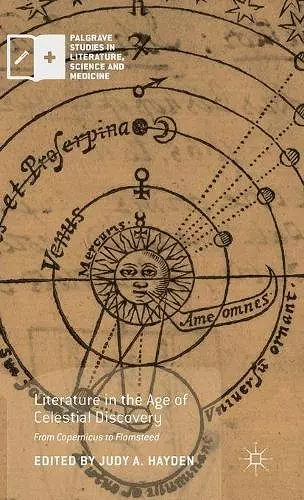Literature in the Age of Celestial Discovery
From Copernicus to Flamsteed
Format:Hardback
Publisher:Palgrave Macmillan
Published:20th Jan '16
Currently unavailable, and unfortunately no date known when it will be back

"The essays assembled here powerfully reveal both the surprisingly enduring nature of early modern resistance to the Copernican revolution in astronomy and cosmology and the rich variety of the literary consequences of the emergence of the New Science. By drawing critical attention to a great range of topics and texts across the long-seventeenth century, this collection brings new concerns and vital insights to the current critical conversation regarding the complex and intriguing relationship between early modern science and literature." - Howard Marchitello, Professor of English, Rutgers University, USA "The early modern period witnessed an extraordinary convergence of astronomy and literature. Copernicus and Galileo prompted new questions: Did the earth move? Were there more worlds than one? Might other planets be inhabited? Literary writers answered these questions, and this bracing and original collection of essays illuminates the literary response to astronomical revolution, from Europe to America, across languages and times, and will be welcomed by all students of the period." - William Poole, John Galsworthy Fellow and Tutor in English, Oxford University, UK
The reconfiguration and relinquishing of one's conviction in a world system long held to be finite required for many in the sixteenth and seventeenth centuries a compromise in one's beliefs and the biblical authority on which he or she had relied - and this did not come without serious and complex challenges.
The reconfiguration and relinquishing of one's conviction in a world system long held to be finite required for many in the sixteenth and seventeenth centuries a compromise in one's beliefs and the biblical authority on which he or she had relied - and this did not come without serious and complex challenges. Advances in astronomy, such as the theories of Copernicus, the development of the telescope, and Galileo's discoveries and descriptions of the moon sparked intense debate in Early Modern literary discourse. The essays in this collection demonstrate that this discourse not only stimulated international discussion about lunar voyages and otherworldly habitation, but it also developed a political context in which these new discoveries and theories could correspond metaphorically to New World exploration and colonization, to socio-political unrest, and even to kingship and regicide.
"The essays assembled here powerfully reveal both the surprisingly enduring nature of early modern resistance to the Copernican revolution in astronomy and cosmology and the rich variety of the literary consequences of the emergence of the New Science. By drawing critical attention to a great range of topics and texts across the long-seventeenth century, this collection brings new concerns and vital insights to the current critical conversation regarding the complex and intriguing relationship between early modern science and literature." - Howard Marchitello, Professor of English, Rutgers University, USA
"The early modern period witnessed an extraordinary convergence of astronomy and literature. Copernicus and Galileo prompted new questions: Did the earth move? Were there more worlds than one? Might other planets be inhabited? Literary writers answered these questions, and this bracing and original collection of essays illuminates the literary response to astronomical revolution, from Europe to America, across languages and times, and will be welcomed by all students of the period." - William Poole, John Galsworthy Fellow and Tutor in English, Oxford University, UK
ISBN: 9781137583451
Dimensions: unknown
Weight: 3992g
224 pages
1st ed. 2090